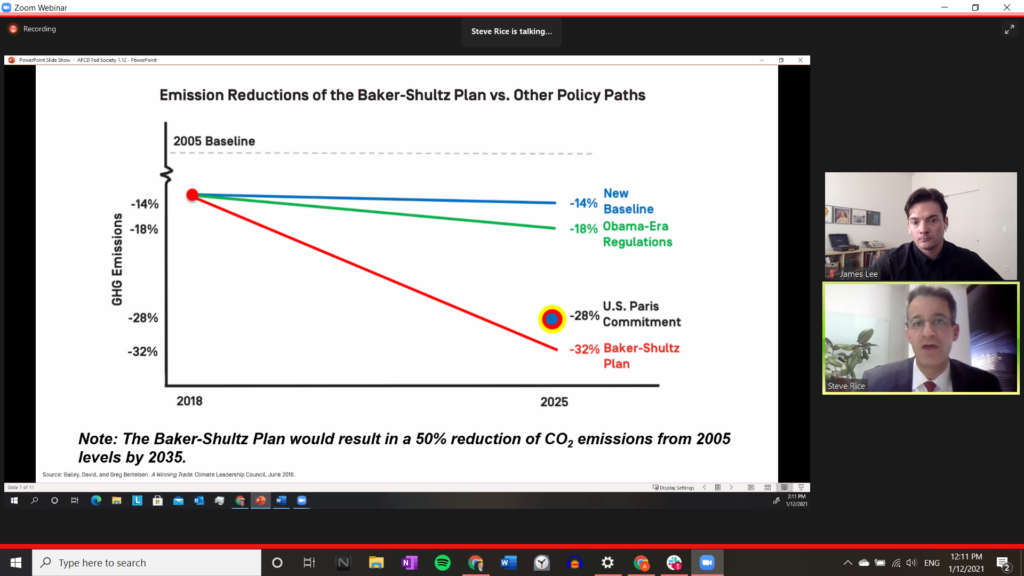Green New Deal, carbon dividends take center stage in BYU Federalist Society climate debate

A Tuesday climate policy debate hosted by the Brigham Young University chapter of The Federalist Society centered around Green New Deal-inspired legislation and carbon dividends as two different approaches the U.S. can take to address climate change.
Steve Rice, managing director of Americans for Carbon Dividends, argued in favor of the Baker-Schultz Carbon Dividends Plan, a plan introduced in 2017 by the conservative Climate Leadership Council to reduce emissions by gradually increasing taxes on carbon dioxide emissions.
Rice explained during Tuesday’s online debate that the carbon dividends plan, named after George P. Shultz and James. A Baker, III, “puts a price on carbon,” which would start at $43 per ton of CO2 emissions and would gradually increase over time.
“Over 15 years, this approach would reduce carbon emissions by 57%,” said Rice. “Those fees do not go to the government, however, they are returned directly to the American people in quarterly dividends.”
The plan also includes a border carbon adjustment that would “charge foreign polluters for the carbon emissions of their products that enter the U.S. market,” according to Rice.
“Emissions reduction is not the job of the U.S. alone,” he said. “The rest of the world needs to do their share. This plan puts the U.S. in the driver seat by compelling other countries to follow our lead, and boosts U.S. competitiveness in the process.”
But Karsten Beling, a coordinator for the Salt Lake City chapter of Sunrise Movement, an environmental nonprofit, argued that “the solutions to climate change must be multi-faceted, addressing multiple areas of the economy at once, as well as providing support to those most affected by environmental and climate problems.”
A more comprehensive response to climate change that federal lawmakers can take, Beling said, is to endorse the Green New Deal, a resolution introduced by U.S. Rep. Alexandria Ocasio-Cortez, D-NY, and U.S. Sen. Ed Markey, D-MA in 2019 to “achieve net-zero greenhouse gas emissions through a fair and just transition for all communities and workers” and “create millions of good, high-wage jobs and ensure prosperity and economic security for all people of the United States.”
“While a carbon tax could definitely be in the legislation of the Green New Deal, a carbon tax is not a silver bullet solution that would fully tackle the massive scale of the climate crisis,” said Beling, an undergraduate environmental studies and history student at Macalester College in Saint Paul, Minnesota, who is from Park City.
Beling continued, “We need many pieces of legislation addressing multiple areas of the economy and human rights for there to be a sustainable shift from our current fossil fuel consuming status quo to one where we no longer need to rely upon fossil fuels.”
Rice noted that only a small minority of Democrats have endorsed the Green New Deal, “so the likelihood of winning a majority is slim.”
“Any climate strategy built on the hopes of sustaining one-party rule is doomed to fail,” said Rice. “Rigid, ideologically driven approaches to climate cannot succeed.”
Rice added that carbon dividends has bipartisan support from multiple Utah officials and community leaders, including Heber City Mayor Kelleen Potter, Heber Valley Chamber of Commerce Executive Director Dallin Koecher and Bill Rappleye of the Draper Chamber of Commerce.
“The reason they’re doing it (supporting carbon dividends) is they want a climate solution that can safeguard Utah’s pristine landscapes, unlock innovation (and) preserve Utah’s way of life for their children and grandchildren,” he said. “They represent that vast majority of Utahns who believe that Utah is being impacted by climate change.”
While the Green New Deal is a non-binding resolution, Beling said it could “shape law” by serving as “a broad statement of principle on which to base future policies and a framework for how to safeguard nature and humanity from the worst effects of climate change, while providing sustainable economic opportunities, clean air and water, and a just future for all.”
“To meet the full scale and severity of the climate crisis, carbon dividends are simply not enough,” he said.